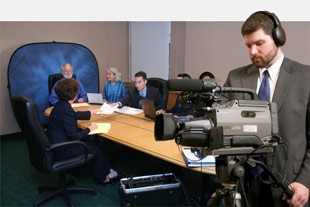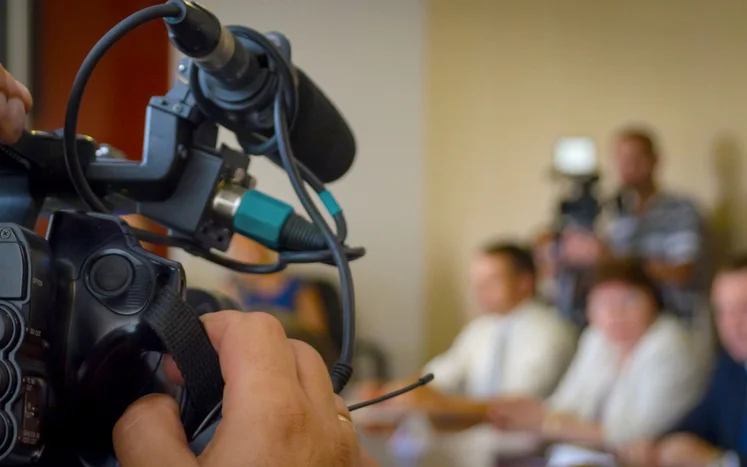The Duty of Lawful Videography in Depositions and Tests
Legal videography has actually emerged as an essential tool in both depositions and tests, supplying a diverse strategy to recording witness testimonies. As lawful professionals progressively identify its worth, it triggers a much deeper examination of just how these visual documents can affect juror assumptions and trial outcomes.

Relevance of Lawful Videography
Legal videography plays a crucial role in the documentation and discussion of depositions and trials. This specialized field incorporates technological abilities with legal knowledge to create a trusted document of procedures that can substantially affect situation results. The visual facet of lawful videography improves the understanding of witness testament, permitting jurors and courts to observe not just the spoken words but also the temperament, emotions, and body language of the witnesses.
Additionally, lawful videography supplies an unbiased account of occasions, decreasing the capacity for misconception that can happen with composed transcripts alone. This aesthetic documents works as a vital tool during trial presentations, promoting a clearer and more convincing story for both plaintiffs and accuseds. Furthermore, the capacity to replay video sections during court proceedings allows lawful groups to highlight key points, reinforcing their arguments successfully.
The importance of lawful videography extends past the court; it also plays a vital role in protecting evidence for future recommendation, whether for appeals or further legal action. As such, its assimilation into the legal process is crucial for guaranteeing a reasonable and exact depiction of the truths, ultimately adding to the pursuit of justice.

Refine of Legal Videography
While recording the nuances of depositions and tests, the process of lawful videography entails a number of important actions that make certain high-grade, precise recordings. Initially, a specialist lawful videographer prepares by assessing the case materials and understanding the specific demands of the deposition or trial. This preparation consists of acquainting themselves with the participants and the context, which helps in catching pertinent information.
On the day of the recording, the videographer establishes up the necessary devices, which generally consists of high-def cameras, microphones, and appropriate lights. Guaranteeing optimum angles and audio top quality is critical, as it directly affects the effectiveness of the recording. The videographer connects with attorneys and individuals to develop procedures, making sure that every person recognizes the recording procedure.
Throughout the deposition or test, the videographer diligently records the procedures, paying close focus to both verbal and non-verbal cues. This includes capturing the behavior and responses of witnesses and lawyers. After the session concludes, the videographer may edit the video footage for clearness and conformity with lawful requirements, generating a last product that properly shows the procedures for future referral and use in lawful contexts.
Advantages in Depositions
The consolidation of videography in depositions uses various advantages that boost the overall procedure of gathering evidence. One main advantage is the capacity to record witness testaments with visual and auditory integrity, giving an extra precise representation of the witness's temperament, tone, and body movement. This multidimensional strategy enables lawyers and juries to evaluate credibility better than standard written records alone.
Additionally, videographed depositions work as a powerful device for maintaining testament. Must a witness ended up being unavailable for trial, their recorded deposition can be played in court, making sure that their evidence stays available and pertinent. This element substantially decreases the threat of losing critical information that can affect case end results.

Finally, videography boosts the total professionalism and reliability of the deposition procedure, instilling confidence in clients relating to the thoroughness of their lawful representation (legal videography). By leveraging innovation, lawyers can significantly improve the effectiveness of depositions
Effect On Tests
In many trials, the combination of videography can substantially affect the discussion of evidence and the court's understanding. Legal videography records witness testaments and essential evidence in a vibrant layout, permitting jurors to engage with the product view on numerous levels. This visual element improves the storytelling element of a trial, offering context and emotional vibration that conventional text-based evidence may do not have.
In addition, video recordings can offer as powerful devices for impeachment during cross-examination. When inconsistencies develop in between a witness's prior statements and their court testament, video clip evidence provides an unbiased recommendation that can sway jurors' point of views. This immediacy and clarity can reinforce the trustworthiness of a party's story while simultaneously weakening opposing disagreements.

Future Trends in Legal Videography
As we look towards the future of lawful videography, several emerging trends assure to reshape its duty within the courtroom. One significant trend is the integration of expert system (AI) in video clip analysis and editing and enhancing. AI can simplify the procedure of recognizing key minutes in recorded depositions, enabling attorneys to swiftly access relevant material, therefore boosting performance in case preparation.
Furthermore, the surge of digital reality (VR) and increased fact (AR) technologies is expected to transform how jurors experience proof. legal videography. By submersing jurors in a simulated atmosphere, these innovations can give a much more extensive understanding of complex scenarios, leading go to even more informed deliberations
Moreover, the raising demand for remote depositions, accelerated by the COVID-19 pandemic, will likely continue. Legal videographers will useful content certainly require to adapt to brand-new software program and systems to ensure high-grade recordings in digital setups.
Last but not least, the expanding emphasis on information protection will certainly require more stringent methods for keeping and sharing video clip proof. As the lawful landscape advances, lawful videographers must remain abreast of these trends to maintain their importance and effectiveness in the judicial procedure.
Final Thought
In recap, legal videography offers a critical function in the judicial process, boosting the stability of depositions and trials. By capturing the nuances of witness testaments, this tool not only preserves essential proof however also help in presenting info effectively to jurors. The importance of visual documentation in examining trustworthiness and helping with interrogation can not be overstated. As modern technology continues to progress, legal videography is poised to further transform its duty within the legal landscape.
Comments on “Affordable Legal Videography Packages for Cases.”